How Long Can You Freeze High Temp Cheese
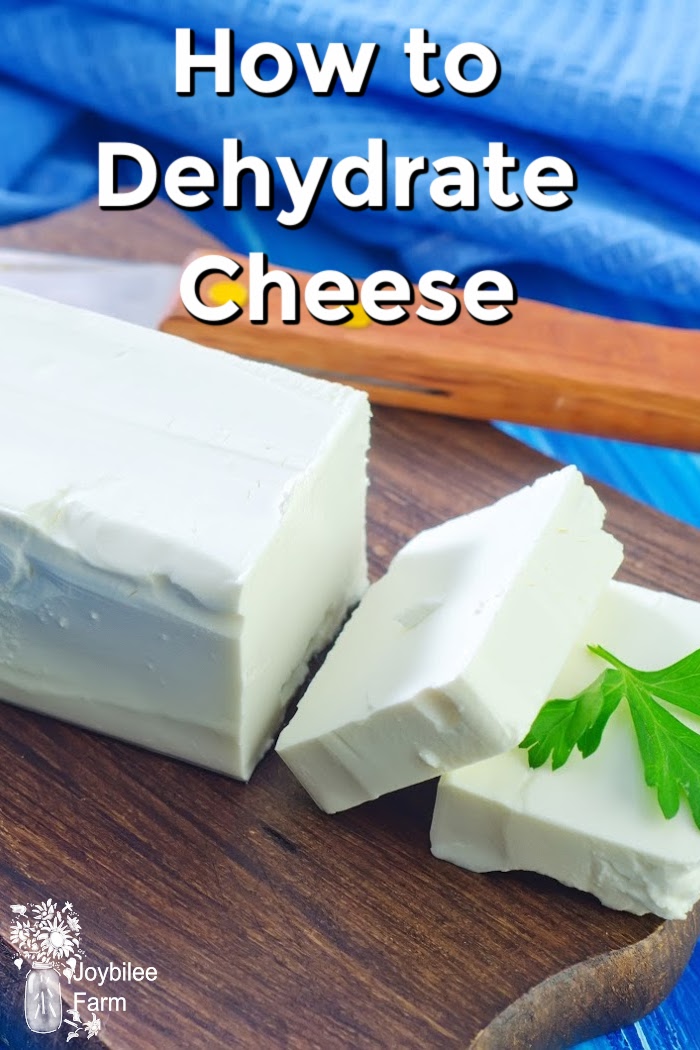

You can dehydrate cheese and save it, without refrigeration, for future use. Dehydrated cheese is a nice addition to homemade trail mix, cereal snack mix, and fruit and nut mixes.
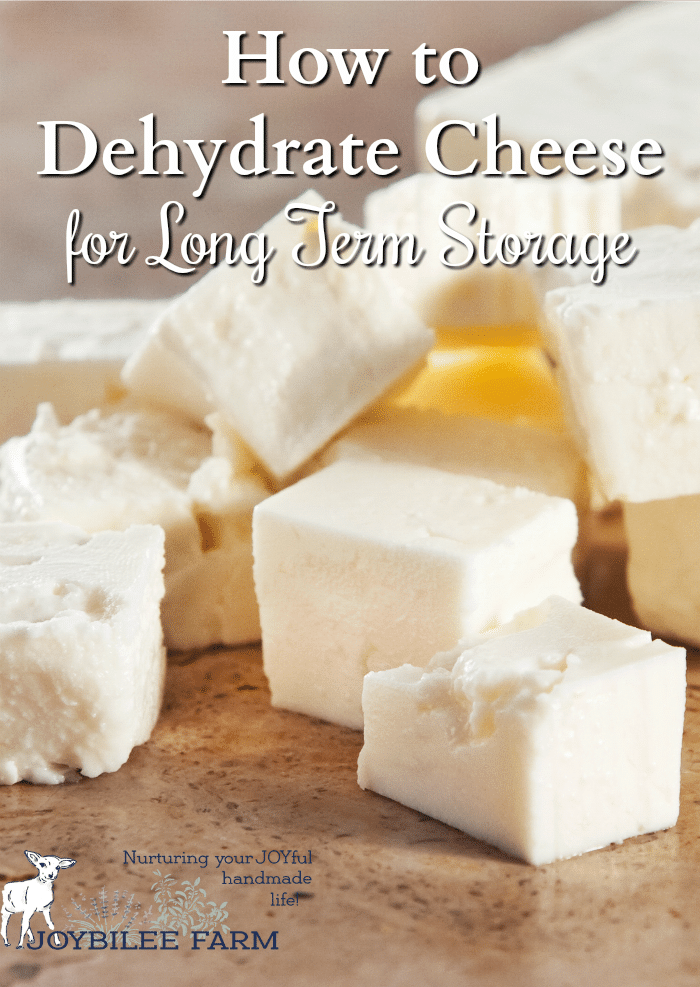
Dehydrate your homemade cheese
Homestead abundance is overwhelming sometimes. The daily milk harvest can quickly engulf a family. Even when you add cheese making, sour cream making, yogurt making, kefir making, whipped cream, and butter making into the weekly chores, you can still end up with more dairy products than a family can consume before it goes bad.
To age cheese properly to store it without refrigeration you need a climate-controlled cabinet that controls both temperature and humidity. While you can build it, it is out of the reach of most beginning homesteaders. Many of you are still waiting for your cheese press, right?
You could put the extra cheese, sour cream, and butter in the freezer for winter. But cheese changes texture in the freezer and becomes more crumbly. Because of the high-fat content, cheese placed in the freezer is only good for about 3 to 6 months. After that, it takes on a "freezer" taste and isn't as nice. Last winter we fed a lot of cheese to our dogs, because of the freezer taste. They loved it. But making cheese is a lot of work for dog food.
Recently my friend, Connie, came to visit and offered me a taste of a trail mix that she had made with dried fruit, nuts, seeds, and dehydrated feta cheese. The dried cheese was good. It was chewy, sweet, crunchy and just a little salty. (Thanks, Connie, for the inspiration.)
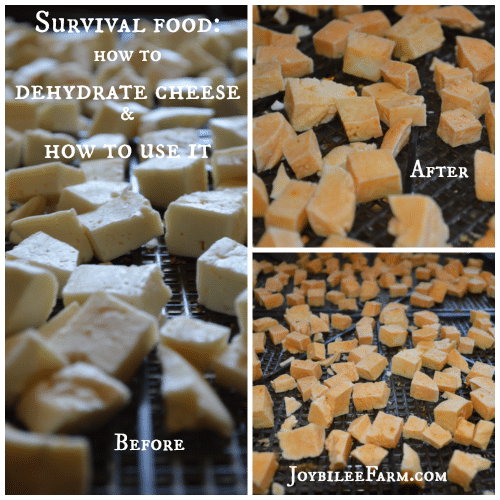
In my goal to reduce food waste….
#NoFoodWasted is my goal but I failed this week.
I just tossed out a pound of feta cheese, that I made from our goat's milk because it had gone funky in the fridge. That's the second pound of cheese I've thrown out since we started milking in April. I hate wasting food. Don't you? And I know that I'm not the only homesteader that can't eat the food I produce faster than the bad microbes consume it.
So the new batch of feta cheese I made went into the dehydrator after it had aged a week in the fridge to develop the flavours. And the result was amazing! It's mild tasting, not the sharp acid taste I was expecting. It was sweet and caramel-y with a hint of saltiness. It squeaks a little when you first bite it, but then it's crunchy and chewy at the same time. It adds protein, minerals, and vitamins to your trail mix or granola. And it's versatile. There are way more uses for dehydrated cheese than just trail mix. I'll definitely be making more dehydrated cheese. I hope you'll try this to extend the shelf life of your precious homemade cheese, too.
(There are questions in the comments about using store-bought cheese in this recipe. I haven't tried it with store-bought cheese. Some store-bought cheese has additives to make it melt more easily at lower temperatures. If you choose to try this with store-bought cheese let me know how it works for you. I've only done this with farm-fresh, homemade cheese with no additions except probiotic culture.)

Step by step guide to making dried cheese
- After making your feta or farmhouse cheese, allow it to age for 5 to 7 days in the fridge. If your cheese seems too moist, rub the outside of the cheese with salt, and let the salt draw the excess water out of the cheese, in the fridge, for 12 hours. Rotate the round of cheese, after 6 hours to dry both sides. Then wipe the excess salt from the cheese, blot any extra moisture from the cheese surface. Wrap in plastic wrap or an eco-friendly alternative, and leave it in the fridge for a week or so. This develops flavours and evens out the moisture levels within the cheese.
- Remove the cheese from the fridge and cube the cheese into ½ inch cubes. You could make them smaller, depending on their end-use. The ½ inch cubes took 36 hours to dry in my dehydrator. I had my dehydrator on anyway to dry the pulp from my juicer, so it didn't use any extra electricity to dry the cheese.
- Place in a single layer on the dehydrator tray. Place in the dehydrator in the coolest spot. If you dry the cheese too quickly the sugars in the cheese could burn.
- Rotate the trays after each 12 hour period and test for doneness.
- The cheese will be hard and crunchy when done and may be lightly browned. There will be no rubbery-ness. There may be a light layer of oil on the surface as the butterfat content of homemade cheese in the spring is high.
- Remove the finished cheese cubes from the dehydrator and allow to cool completely before packaging in a glass jar with a tight-fitting lid.
- Store in a cool, dry place to extend the shelf life of the dehydrated cheese. It should last for several months in cold storage or longer if you can vacuum seal it.
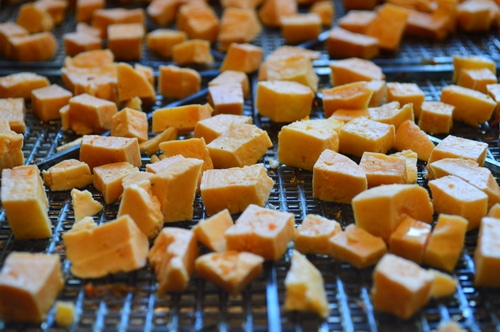
A dozen ways to use dehydrated cheese
- Add to the granola after it's cooled down.
- Add to trail mix
- Put the cubes on a tossed salad in the place of croutons
- Put the cubes in Greek salad in the place of feta cheese
- Use to top a casserole, as you would bread crumbs
- Eat it as a snack – a few cubes are a high energy snack
- Put them in your emergency supplies and your bug out bag – replace them every 12 weeks to keep your stores fresh.
- Grind it to a powder and use as a cheesy spice mix, add chives, parsley, and Himalayan salt
- Add the powdered cheese to a white sauce to turn it into a cheese sauce
- Add 1 tbsp of the powdered cheese to Caesar salad dressing in place of parmesan cheese
- Powder it and use it as popcorn seasoning
- Powder it and add it to cheese biscuits and pizza dough
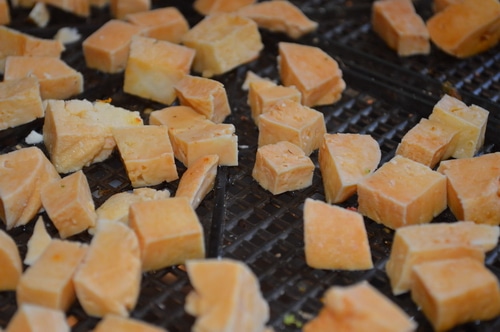
I hope you were inspired to try this and extend the shelf life of your precious homemade cheese.
Your Turn:
If you've tried to dehydrate cheese, how did it turn out? What types of cheese have you dehydrated? How do you enjoy using your dehydrated cheeses? Leave a comment, I'd love to hear from you.
How Long Can You Freeze High Temp Cheese
Source: https://joybileefarm.com/survival-food-dehydrate-cheese/